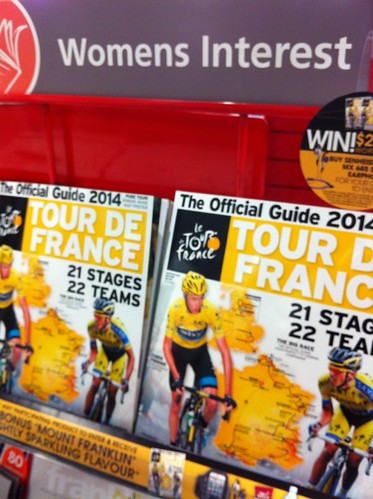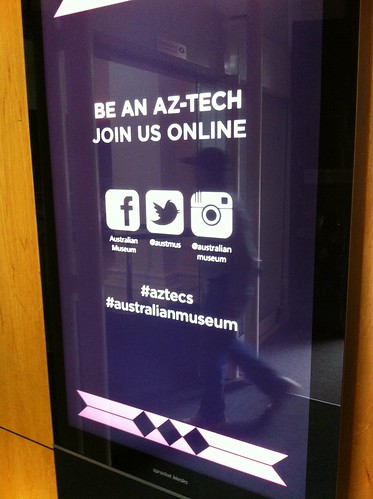 This is a lovely (disturbing and brilliant) exhibition, and before you reach it, you are informed about the social media available, how to connect to the museum, and the exhibition. This photograph shows one of the screens which do this. You can see more examples of how they promote the hashtags and connect people to their social media.
This is a lovely (disturbing and brilliant) exhibition, and before you reach it, you are informed about the social media available, how to connect to the museum, and the exhibition. This photograph shows one of the screens which do this. You can see more examples of how they promote the hashtags and connect people to their social media.
Thursday, December 18, 2014
Aztecs at the Australian Museum
 This is a lovely (disturbing and brilliant) exhibition, and before you reach it, you are informed about the social media available, how to connect to the museum, and the exhibition. This photograph shows one of the screens which do this. You can see more examples of how they promote the hashtags and connect people to their social media.
This is a lovely (disturbing and brilliant) exhibition, and before you reach it, you are informed about the social media available, how to connect to the museum, and the exhibition. This photograph shows one of the screens which do this. You can see more examples of how they promote the hashtags and connect people to their social media.
Wednesday, December 17, 2014
book2art meets twitter reading group - kind of
I really like the Library as incubator project blog, I have it in my rss feed and really enjoy their posts.
They have an interesting reading group called booktoart which encourages reading groups to make things inspired by the books which are read each month. You can join the reading group as a library or as an individual. There are reading group resources available, so you can read along and craft along too.
While joining this group would be great (and it would be), you could also encourage people to be inspired by making something no matter what is read. Each title or theme could serve as an inspiration.
This is what I did in 2011 when the twitter reading groups (now Read watch play) was started. It first came to life as readit2011. I wanted to encourage people to think about how the themes could be used in their libraries, and so chose a random example of what is possible. I decided that I would make a tea cosy to match each theme. While the themes are for a twitter discussion they work very well for library displays, story times, face to face reading groups, library programming and much more. My tea cosies were hopefully a way to help some people think more broadly about what is possible. They were only ever mentioned on twitter or my blog as they were an out of work activity for me.
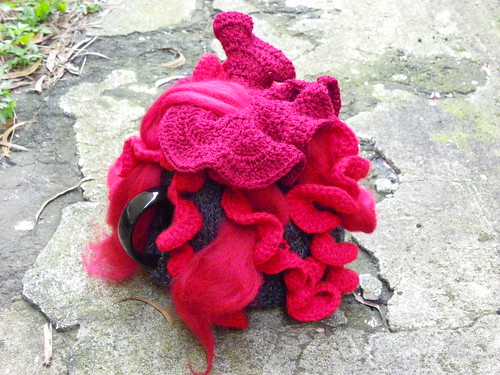 This image shows the tea cosy for #whodoneitit - using crime as an inspiration, and obviously a very bloody crime scene. It is crazy.
This image shows the tea cosy for #whodoneitit - using crime as an inspiration, and obviously a very bloody crime scene. It is crazy.
It was only when I started to read about the booktoart club that I started to think about these again, as most of the tea cosies were given away.
They have an interesting reading group called booktoart which encourages reading groups to make things inspired by the books which are read each month. You can join the reading group as a library or as an individual. There are reading group resources available, so you can read along and craft along too.
While joining this group would be great (and it would be), you could also encourage people to be inspired by making something no matter what is read. Each title or theme could serve as an inspiration.
This is what I did in 2011 when the twitter reading groups (now Read watch play) was started. It first came to life as readit2011. I wanted to encourage people to think about how the themes could be used in their libraries, and so chose a random example of what is possible. I decided that I would make a tea cosy to match each theme. While the themes are for a twitter discussion they work very well for library displays, story times, face to face reading groups, library programming and much more. My tea cosies were hopefully a way to help some people think more broadly about what is possible. They were only ever mentioned on twitter or my blog as they were an out of work activity for me.
 This image shows the tea cosy for #whodoneitit - using crime as an inspiration, and obviously a very bloody crime scene. It is crazy.
This image shows the tea cosy for #whodoneitit - using crime as an inspiration, and obviously a very bloody crime scene. It is crazy.It was only when I started to read about the booktoart club that I started to think about these again, as most of the tea cosies were given away.
Tuesday, December 16, 2014
creating content
I use different online tools from time to time to create content. I have been making calendars for a few years. This year I was back to Redbubble (and I have to mention the brand so you can see the example). I was uploading photographs for a calendar, but the site suggested lots of other things I could do with the same content. You can see some of the examples in the image below.
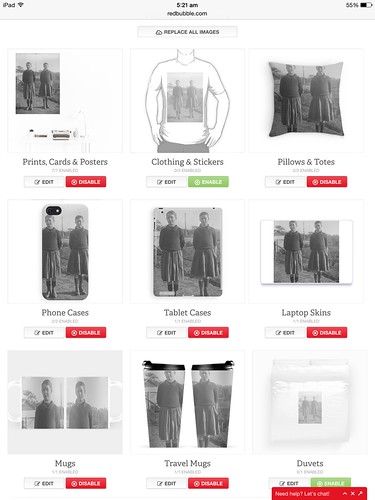
I think there is a lot of potential for public libraries to load a dozen or so photographs into this. With a dozen photographs you have have a print on demand calendar, and then with a few more minutes spent on the site have many other merchandise options, again print on demand so there is no financial outlay for the library. You can make sure your library logo, website, and other details are on the items, just as you do for things which are printed. These just happen to be print on demand.
I tried some of the bags, and this is how they turned out. They look better in real life than in this photograph - and I am really pleased with them.
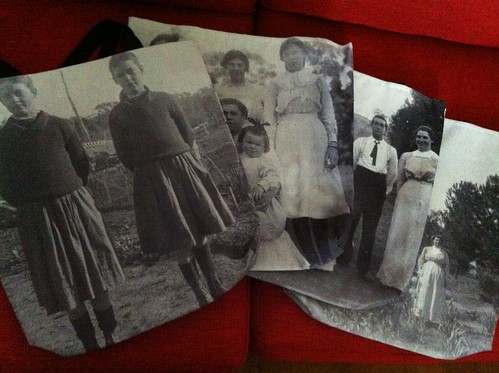
This is the original photograph.
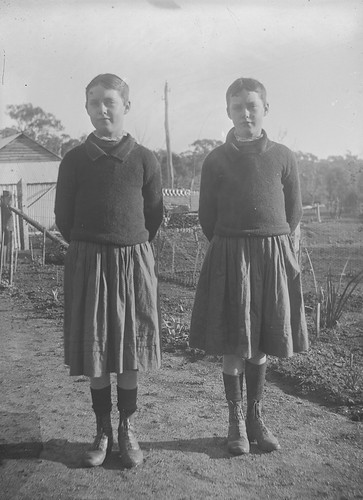

I think there is a lot of potential for public libraries to load a dozen or so photographs into this. With a dozen photographs you have have a print on demand calendar, and then with a few more minutes spent on the site have many other merchandise options, again print on demand so there is no financial outlay for the library. You can make sure your library logo, website, and other details are on the items, just as you do for things which are printed. These just happen to be print on demand.
I tried some of the bags, and this is how they turned out. They look better in real life than in this photograph - and I am really pleased with them.

This is the original photograph.

Labels:
localstudies,
makers,
making,
print on demand
Sunday, December 14, 2014
#sharethewow with Halifax Public Library.
This hashtag came through my twitter stream thanks to @ryandeschamps. There is a new central library and they have a great hashtag which lots of people have been using to share the joy of the new library. It looks lovely, and people seem to be having a great time in it, and sharing their enjoyment through social media.
Thursday, December 11, 2014
My review of Information doesn't want to be free: laws for the internet age
 Information Doesn't Want to Be Free: Laws for the Internet Age by Cory Doctorow
Information Doesn't Want to Be Free: Laws for the Internet Age by Cory DoctorowMy rating: 5 of 5 stars
I am tempted to simply say read this, it is useful (and full of stories), but that may not be enough.
This is an excellent book for library workers to read as it is a reminder about the importance of changing copyright laws. This book is written to target writers and other creators of content, and the information for this sector has big implications for libraries. It also can be used by libraries who are creators of content (which perhaps should be all libraries).
How content it created and distributed can change how it can be collected by libraries, and some of the methods used would present challenges to purchase orders. Reading this raises many questions for library staff to think about for collecting content so that it is accessible now and into the future.
This is an angry and yet a hopeful book, with much useful information. It is a fast read, with much to think about.
To quote from this book "I don't think the conclusion is foreordained. ON bad days. I'm petrified of the extent to which a despot could use technology to perfectly spy, to perfectly coordinate an army of thugs. But even on bad days, I believe that the only answer to this fear is to seize the means of information and ensure that technology's benefits are distributed to everyone, not just the powerful. A refusal to engage with (or protect) technology doesn't mean that the bad guys won't get it - just that the good guys will end up unarmed in the fights that are to come."
Also from the book "If we have to choose between that vision of copyright and a world where more people can create, more audiences can be served, where our devices are our honest servants and don't betray us, where our networks are not designed for censorship and surveillance, then I choose the latter, I hope you would too."
View all my reviews
Tuesday, December 9, 2014
instameet and museums
Have a look at this photograph. (the embed option kept timing out, hence the link not the embed).
You can read about other instameet events like:
You can read about other instameet events like:
This also seems to tie in with the ideas of Invasioni Digitali / Digital Invasions – Co-Creation of Cultural Value (from #mwf2014). Also see #invasionidigitali and on Pinterest.
There are other instameet options like:
- Logan City Council nature walk
- Adelaide City Council
- ABC Open
- Atherton Tablelands
- San Francisco public library
We are the dead - a Canadian commemoration of all their war dead
I came across the twitter stream We are the dead which you can find out more about here. It is powerful, simple but very powerful.
Tuesday, November 25, 2014
twitter mirror
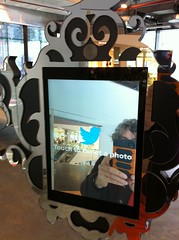
The image on the left shows a Twitter mirror at Protiotype which took place in August. It was part of a display of new technology and you could have your experience auto-tweeted.
I thought this would be great at various events, giving a way of providing visual feedback. You could have a series with people excited by what they are borrowing at the library, or various programming possibilities.
The below image shows me concentrating on reading the text on the twitter mirror
Live from the Twitter Mirror... #Protiotype #SydDes #IoT pic.twitter.com/pgsugjGVZB
— Protiotype (@Protiotype1) August 20, 2014
Tuesday, November 18, 2014
My review of Games in libraries
 Games in Libraries: Essays on Using Play to Connect and Instruct by Breanne A Kirsch
Games in Libraries: Essays on Using Play to Connect and Instruct by Breanne A KirschMy rating: 4 of 5 stars
I really enjoyed this book as it explored games mainly in the context of university libraries. There was a quote from Scott Nicholson, Associate Professor at Syracuse University saying that we need to look as games as "a distinct form of storytelling" and then he highlighted elements of good story telling and draws connections to games. "Storytelling creates a comforting and inviting environment for people to spend time in the library".
The book has chapters which provide overviews and chapters which provide case studies, including what the library learned from the experience of running games programs. It was particularly interesting to see how some of the libraries evaluated the effectiveness of the games. For one it was a measure of who had not previously been in the library.
There is also an extensive resources section which highlights key publications to help libraries explore games. I was thrilled to find that one of my papers was included in this section. It was very kind of the chapter author to include this reference.
While this publication focuses on games in an academic and school library context, there will be much to appeal to public library staff as well. Go and read this book. It also provides suggestions for other key games and library books to explore (so go and read these as well).
View all my reviews
How the British Library supports designers - Inspired by... blog
How the British Library supports designers - Inspired by... blog
Yet more brilliant work by @BL_Creative
This is a lovely way of inspiring people about the collections.
Yet more brilliant work by @BL_Creative
This is a lovely way of inspiring people about the collections.
Saturday, November 15, 2014
International Games Day at Your Library - Digital scholarship blog
International Games Day at Your Library - Digital scholarship blog
Great to see the involvements of the British Library (and it would be great to be able to go along to these sessions).
Great to see the involvements of the British Library (and it would be great to be able to go along to these sessions).
Archives Week and Storify
I enjoy a good use of Storify, and this one from the UK National Archives is a lovely one. It highlights the range of work archives do. Have a look at their other uses of Storify as well.
Labels:
#dayinthelife,
archives,
social media,
storify
Thursday, November 13, 2014
location based encouragement to use social media
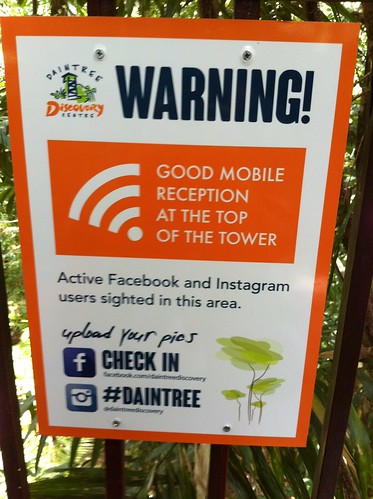
This sign was in the Wet Tropic World Heritage Area. I like the way they let me know the hashtag, while I was onsite, and how I can connect on facebook. They were efficient on Instagram, as the two images I posted using that hashtag were liked within 24 hours (by this group). There was little mobile coverage in this area,(and mostly no mobile coverage further north) so it was a nice way to let people know about it. I have written blog posts about this before, and I really like location based information.
Tuesday, November 11, 2014
anticipation, through signs
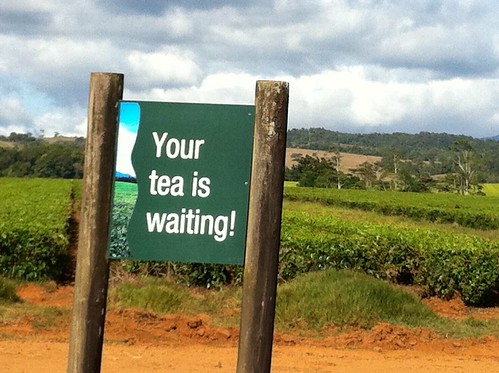
This sign was at the Nerada Tea Estate near Malanda, Queensland. I had been passing other signs which were building anticipation (but not where I could safely photograph them). This one was near the car park, and just hit the spot.
Saturday, November 8, 2014
RA for All: Soapbox Rant About Judgemental RA Librarians by Becky Spratford
RA for All: Soapbox Rant About Judgemental RA Librarians: Those of you who know me, even a little, know that I am not a person who is ashamed to state my opinion, even if it means disagreeing with a...
This is a wonderful blog post by Becky Spratford, a very skilled and knowledgable librarian. Read her post - and think about your collection, display and readers advisory strategies (and think about what you will suggest to readers and how you will do it). I was so exited about this post I not only tweeted it, I am reblogging it here.
This is a wonderful blog post by Becky Spratford, a very skilled and knowledgable librarian. Read her post - and think about your collection, display and readers advisory strategies (and think about what you will suggest to readers and how you will do it). I was so exited about this post I not only tweeted it, I am reblogging it here.
Thursday, November 6, 2014
local studies at the supermarket - in Mossman, Queensland
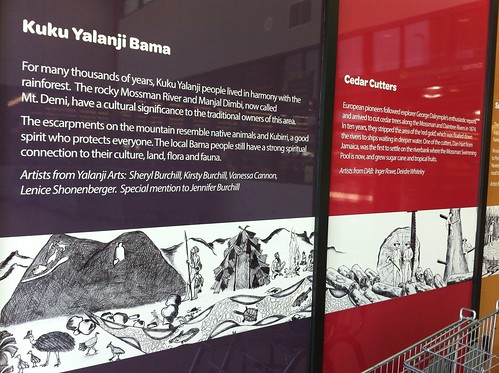
These two photographs show part of the entrance to Woolworths at Mossman in Queensland. I was interested seeing the local studies information as I walked in, as I have not noticed it in other supermarkets. It seemed an interesting inclusion.
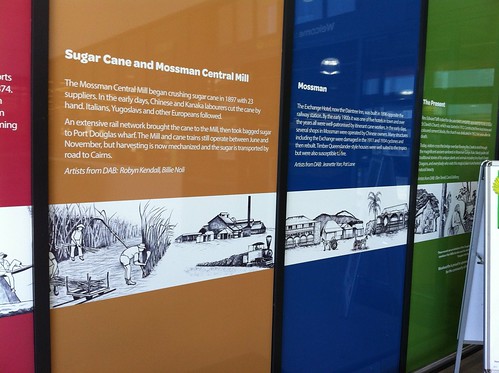
Tuesday, November 4, 2014
City Library, Cairns Libraries
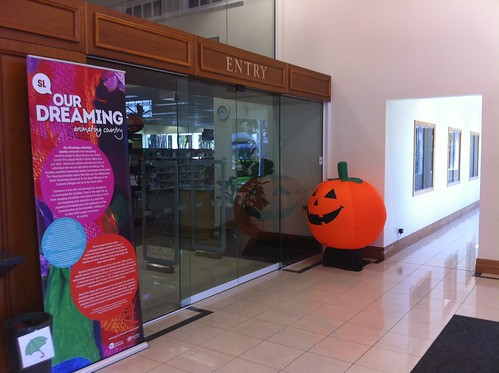
This shows the entrance the library, and exhibition currently on. The halloween display was all through the library. It was a 1920s building which had a refurbishment opening up the walls - into lots of glass. It was a well used library.
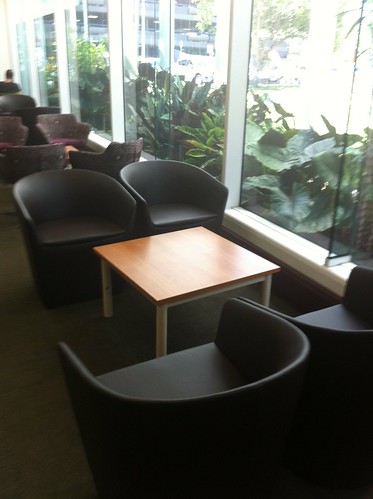
This shows a nice seating area in the library.
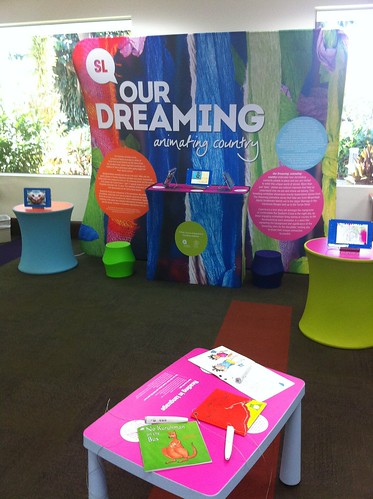
This was a very impressive exhibition. It had lots of children using it, and so I could not photograph it for a while. You can see more photographs of the library here.
Thursday, October 30, 2014
Daintree Tea and location based marketing
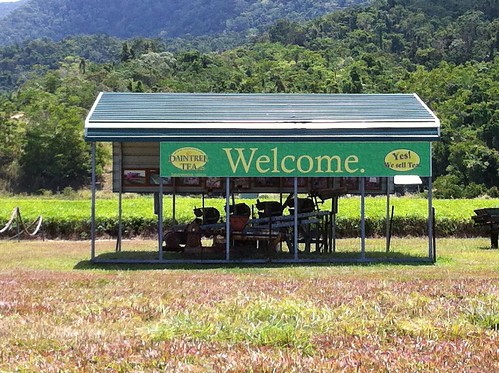
This is what you see when driving to Cape Tribulation.
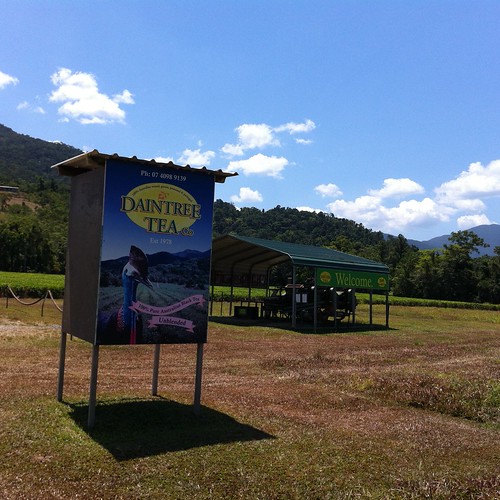
It really is at the tea plantation.
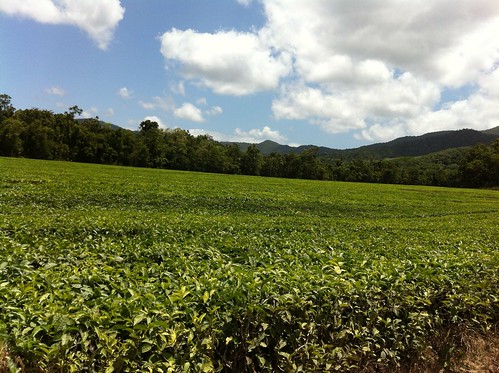
They have an honesty box where you can buy the Daintree Tea (and yes, I bought some here).
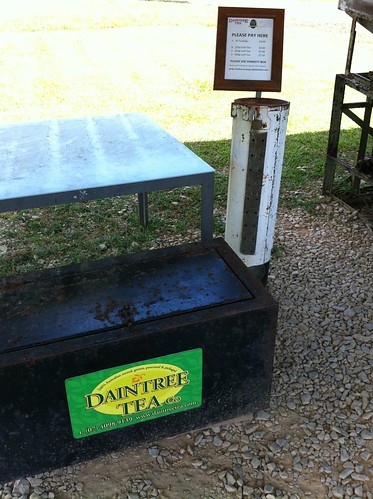
They also let you know they are on facebook (at the tea plantation)
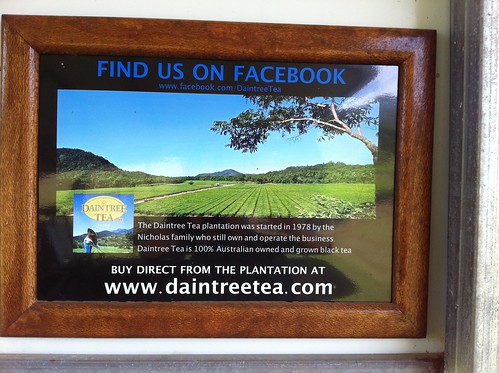
Supermarkets (south of the Daintree River) were also letting you know it was local tea
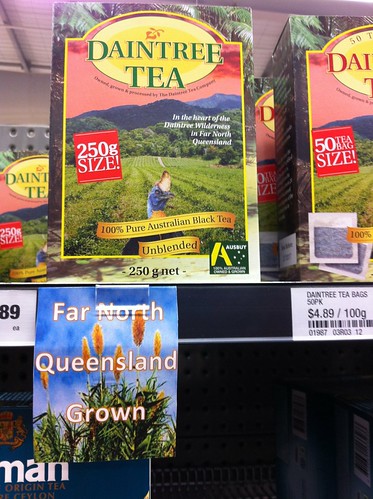
and
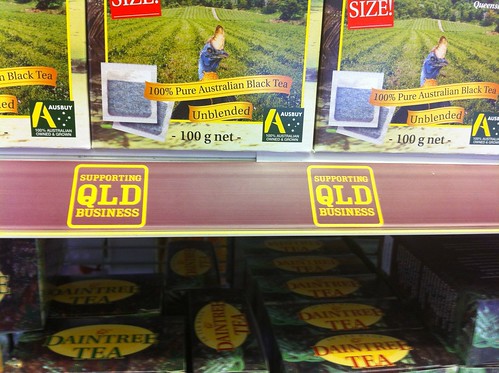
I am including all the photographs of tea and promotion, to show that it does not have to be fancy. I really liked the way the tea was promoted at the tea plantation. I was thrilled there was an honesty box (I had never bought tea this way before). They were taking advantage of the location, and it was in a smart and professional way. It is lovely tea too.
Tuesday, October 28, 2014
My review of Good guys wear black - and there is a library connection here
 Good Guys Wear Black by Lizbeth Selvig
Good Guys Wear Black by Lizbeth SelvigMy rating: 3 of 5 stars
As you can tell from my reading on Goodreads, I don't read much romance. I investigated this one because I was interested to see how a librarian would be depicted in current romance. A short way into this book I was wondering if it had an endorsement from the American Library Association (like the NASCAR/Harliquin connection) as there was very detailed information provided about the freedom to read and Banned books week. Various characters gave very clear and detailed explanations about the importance of the freedom to read, and of how Banned books week could be used to heighten awareness of previously banned titles. There was also a good description of how communities can register a complaint about a book. This was of interest as we have a very different approach in Australia, with much less banning. I felt these descriptions dominated the story for a long time, but they may have been needed for some character and story development.
The main man in the story was called Dewey, and I did not feel nearly enough was made of his name when he started getting to know the new librarian in town (trust me, this is not a spoiler).
I had a few concerns about how the library was depicted. Much attention was given to the children's area (and the new librarian was described as a specialist in this area), however, signage seemed to be handmade, and there was no mention of current technology in the library.
A few asides, the cover is not an accurate representation of the main man, Dewey. This book came to my attention via an rss feed.
View all my reviews
Sunday, October 26, 2014
My review of Knitting for good
 Knitting for Good!: A Guide to Creating Personal, Social, and Political Change Stitch by Stitch by Betsy Greer
Knitting for Good!: A Guide to Creating Personal, Social, and Political Change Stitch by Stitch by Betsy GreerMy rating: 4 of 5 stars
I first read Betsy Greer's work in the anthology she complied called Craftivism. This earlier work show the origins of her later one. This book is her personal story of coming to knitting and discovering the connections which can be made with it, connections to many people, including a previously difficult to speak with relative, connections to strangers who see her knitting in public, and connections to activism, or craftivism. This personal story shapes the narrative, but does not overwhelm it. The author has been very proactive in using her knitting to connect to others, and made me think that I should make a few changes around how publicly I knit.
Interspersed within this work are the stories of others, told in their own words about how crafting has connected them more deeply to their community either nearby or to be able to help strangers who they may not meet. There are also knitting patterns which can be used for different works of craftivism/charity knitting. When reading this, I kept thinking about the many knitting groups in public libraries across Australia who knit for Wrap with love and other charities, and the powerful act of craftivism these many people are continuing to do. It was great that this was brought to mind by reading this work.
View all my reviews
Sunday, October 5, 2014
Reading inspired making
This latest blog post from Patrick Rothfuss shows some examples of what people have been inspired to make after reading his books. It starts with photographs, but goes on to other made things. It is lovely to see how different people were inspired to make. There are ideas for readers advisory and library programming. Think about the possibilities in the book2art reading group too.
Saturday, October 4, 2014
My review of Making is connecting
 Making Is Connecting by David Gauntlett
Making Is Connecting by David GauntlettMy rating: 4 of 5 stars
The title sums up the book, but it is still a really good idea to read the book and explore the way the ideas are presented.
A key quote is:
"Why is everyday creativity important? Because I feel that it's incredibly important - important for society - and therefore political...But it is the fact the people have to make a choice - to make something themselves rather than just consume what's given by the big suppliers - that is significant. Amplified slightly, it leads to a whole new way of looking at things, and potentially to a real political shift in how we deal with the world."
The author brings together many examples of making, using examples from social media (including Flickr and Youtube) but also using some offline examples of making as well. Gauntlett has a very interesting discussion about art/craft encouraging people to rethink how they think about them, and his discussion is very interesting.
He also looks at Ruskin and the work of William Morris, and this adds a very helpful viewpoint to the discussion. It also highlights the need to explore examples of good practice. Making is very much about making yourself as part of making things, and about our place as citizens. To quote from Ruskin, and this book 'do what you can'. It is also about thinking about consequences for our actions, including the environmental consequences. "Crafting can be a reclamation of the power of life".
I enjoyed reading this book and it is adding to the ideas which I am exploring in this area. It was an entertaining and interesting read where stories were used effectively to illustrate points.
View all my reviews
Friday, October 3, 2014
My review of DIY Citizenship: critical making and social media
 DIY Citizenship: Critical Making and Social Media by Matt Ratto
DIY Citizenship: Critical Making and Social Media by Matt RattoThis is a really interesting read. The rating of three indicates the varying interest of the chapters. Some were amazing, and for others, I was not the right reader for them, or the time was not right.
One quote from the book is:
"Online knitting community sites such as Ravelry, have also facilitated and energised new and existing offline "stitch n bitch" groups, pub knitting circles, fibre festivals, and knit meets providing a range of virtual and physical sites for participating in knitting as a shared, collaborative, and public activity. At both ends of this spectrum of leisure and activist knitting, technology use goes hand in hand with craft. Knitting, alongside online articulations and representation so knitting, are seen as recursive digital/social practices, connecting material and physical activities with social networking, microblogging, and face-to-face interaction".
This quote highlights some key themes shown in several chapters which are the key use of social media and online interactions with offline activities. There is the exploration of "digitally mediated maker identity" which uses digital spaces and interactions "extending the boundaries of their physical artifacts into digital realm as a conscious, reflexive activity".
GLobal connections are explored, as a very local initiatives. Some chapters report on existing practices and analysis of them, others describe one off projects designed to explore ideas in this area. Gardens, zines, electronics and much more are explored in this work.
View all my reviews
Saturday, September 27, 2014
My first photographic credit
I am thrilled to have my first photograph credit.
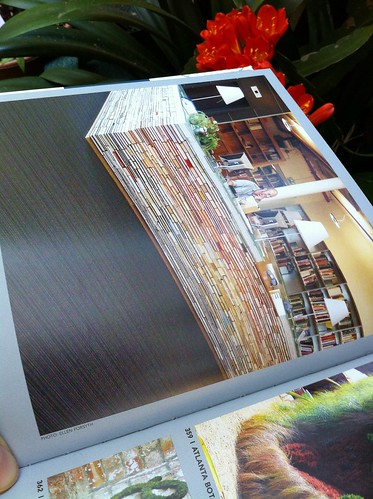
You can see a better angle of the photograph here
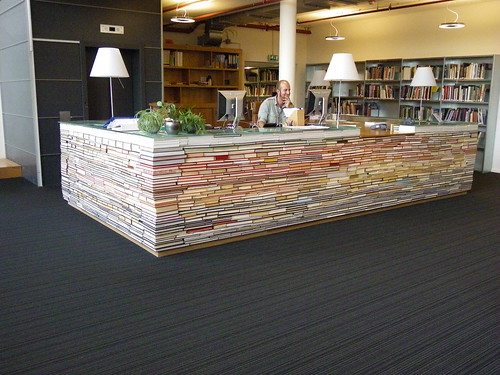
To see more of the photographs I took at TU Delft Architecture Library, have a look at my set on Flickr.
Another post about people using images and removing the metadata
I have written about this before, and it tends to bring a wry smile rather than any other reaction now, when it happens to me.
I came across this by accident
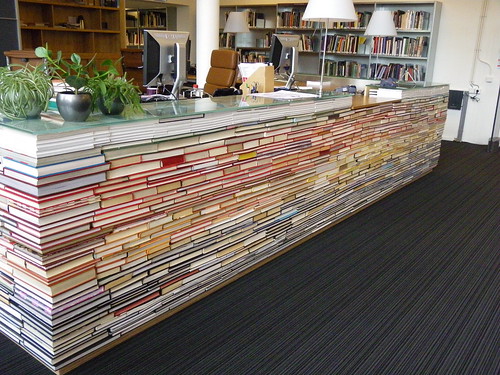
It was nice to see the photograph being used, and it is great to see the Garage Sale Trail being promoted, so all is good.
I came across this by accident
Run out of space on your bookshelf? #Reuse those extra books to make a desk! #vintage #books #garagesaletrail pic.twitter.com/2OGCYrI5Dd
— Garage Sale Trail (@GarageSaleTrail) August 27, 2014
which looks very similar to this
It was nice to see the photograph being used, and it is great to see the Garage Sale Trail being promoted, so all is good.
Wednesday, September 24, 2014
Adopt a Book at the British Library
Adopt a Book at the British Library helps fund conservation work. They have just added some Gothic titles, to tie in with a celebration of 250 years of Gothic writing - Terror and wonder (exhibition opening soon). I really like this as a way of helping provide funding for a library, and I like the way the British Library is thinking about it, including having a blog post about one of the conservators - see Meet adopt a book conservator Rick Brown.
You could also think about supporting this for All hallows read, as it is giving a book, but just a bit differently.
Also think about giving a book for All hallows read - as reading horror is important. And think about how you promote reading horror this October, at your library.
You could also think about supporting this for All hallows read, as it is giving a book, but just a bit differently.
Also think about giving a book for All hallows read - as reading horror is important. And think about how you promote reading horror this October, at your library.
Friday, September 19, 2014
living library...gardens and information
Eastern Counties Regional Library in Nova Scotia, Canada has community gardens at six of their libraries. Each garden is run differently, depending on the community. There are very deliberate links to information provision as part of this garden and library connection.
Sunday, September 14, 2014
My review of Craftivism by Betsy Greer
 Craftivism: The Art of Craft and Activism by Betsy Greer
Craftivism: The Art of Craft and Activism by Betsy GreerMy rating: 5 of 5 stars
I had not come across the term craftivism before reading this book, but I had come across the actions of craftivism, having seen many people be active in Wrap with love, and other charity knitting done in many libraries, as well as other public projects (and been involved in some myself).
This book brings together a wonderful range of craftivism people and actions, some you will have heard of and others which are new. There are some lovely options, which help communities, such as the crafted baskbetball nets to replace stolen and vandalised ones, and the work of the Adithi collective who were stitching the story of Chile, but were not regarded as dangerous as they were embroidering. Their embroidery was able to tell people what was happening (because it was regarded as harmless), this subversiveness was critical for sharing information outside the country during a very tough time.
Some of the stories are about individuals and their singular paths of craftivism, while others are stories of communities or groups working together.
There are a many countries and styles of craftivism discussed, as well as some interesting historical examples. This book would be useful for libraries to add to their collections for local craftivists, but also for thinking about programs and services provided by the library, and for helping people connect to information to help with their craftivism. This is a key role which libraries and their staff can play.
It struck me that there should be a deliberate discussion in more places (including libraries), so that people think more strategically about the craftivism, and acknowledge that it is as powerful as it is.
I am now doing a lot of catch up reading about craftivism.
View all my reviews
Saturday, September 13, 2014
Makers place, Leichhardt
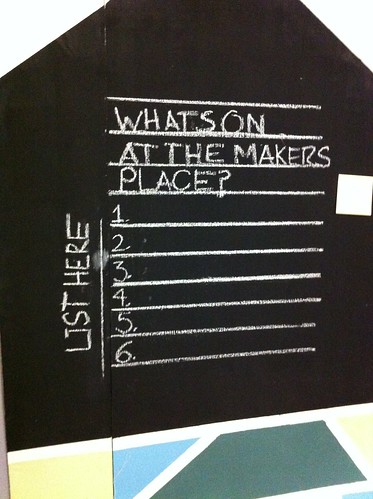
This makers place / maker space opened last night in Leichhardt. It is a pop up space, so it will be interesting to see what happens over time. There were other things there, but I could not have photographed them without being really intrusive. A potter was making pots on a wheel, there were four 3D printers, a microbiology space and a few other things. It looks really interesting. Thanks to @anne_doherty1 for the information about this.
You can see a few more photographs of the space here.
Three farm are working with various partners on this, including the local council.
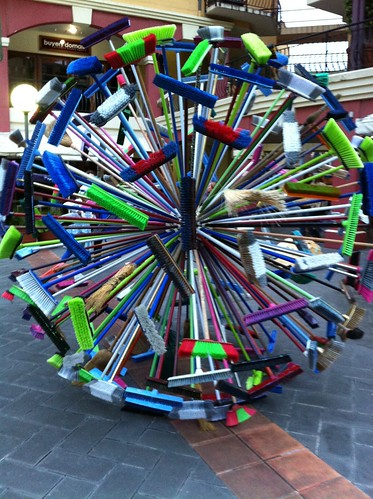
I have no idea if this sculpture is linked to the Makers place (I think it may be), but as I am reading Un Lun Dun by China Mieville it seems a rather wonderful connection with that novel, and a wonderful reuse of brooms.
Tuesday, August 19, 2014
Science Museum tours on twitter.
This came to my attention because I follow Medium, and read this article about Museum tours on twitter by Will Stanley. It is a good idea to read the article before reading this post.
The Storify is beautifully done, because it records the twitter tour and it bring the comments about it to the stream as well, highlighting the conversation. I like the use of the Science Museum twitter account, and that the curator being identified as leading the tour. This is lovely. This could be done for so many local studies events and location. Imagine tweeting a walking tour, so that someone could do the tour by following the tweets or be able to able to see the tour without being there. It would be great to highlight collection items, the way the Science Museum has. It would also work well for local festival (to help record them for local studies).
Have a look at more of the use of Storify from the Science Museum.
The Storify is beautifully done, because it records the twitter tour and it bring the comments about it to the stream as well, highlighting the conversation. I like the use of the Science Museum twitter account, and that the curator being identified as leading the tour. This is lovely. This could be done for so many local studies events and location. Imagine tweeting a walking tour, so that someone could do the tour by following the tweets or be able to able to see the tour without being there. It would be great to highlight collection items, the way the Science Museum has. It would also work well for local festival (to help record them for local studies).
Have a look at more of the use of Storify from the Science Museum.
Monday, August 18, 2014
Staff can help...
I saw this in the Waterstones Bookshop at Sydney
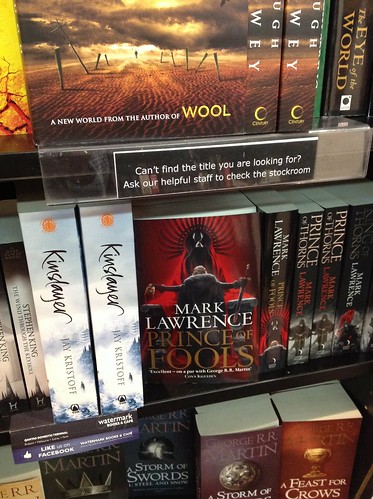
You could see staff in the shop helping people, but this seemed another way to let people know that they could ask for staff assistance.
They also make it easy to connect with them on facebook.

You could see staff in the shop helping people, but this seemed another way to let people know that they could ask for staff assistance.
They also make it easy to connect with them on facebook.
Sunday, August 17, 2014
Mini Maker Faire and a few other things at the Powerhouse Museum 16 August 2014
The @OpenROV stall at @MakerFaireSYD is set up! #MMFSYD pic.twitter.com/bV1WFAs6eu
— Dominik Fretz (@codewithpassion) August 15, 2014
You can follow other OpenRov devices as well for example, the one in this photograph is @rov1081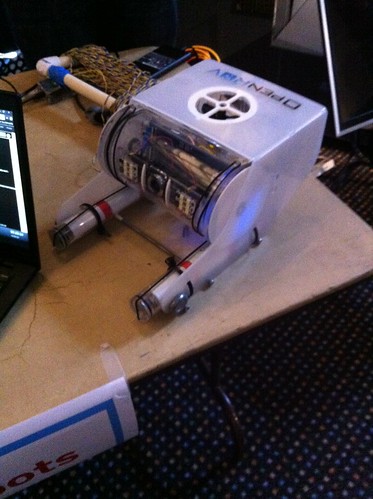
This was part of the Mini Maker Faire which is at the Powerhouse Museum this weekend.
I had been to maker fairs before, they just have had many different names. This one was a lot of fun because of the diversity of makers.
The Embroiders Guild was present encouraging people to add to a collaborative piece of embroidery, and to have a go.
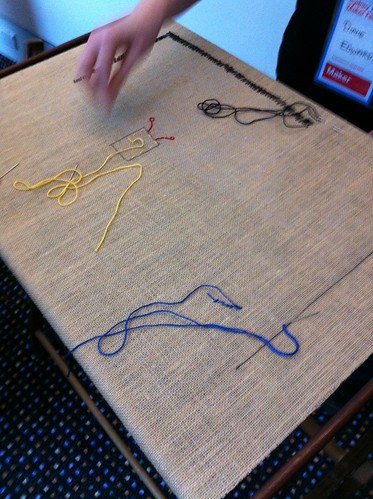
Lace makers were in the Lace Centre showing needle and bobbin lace methods.

You could have a try at bobbin lace, which was was soothingly mathematical.
The fablab was going apace with the Hack the collection items being printed. The museum objects were in their cases, and their new partners were being printed. You can read about it here, and access the museum files here.
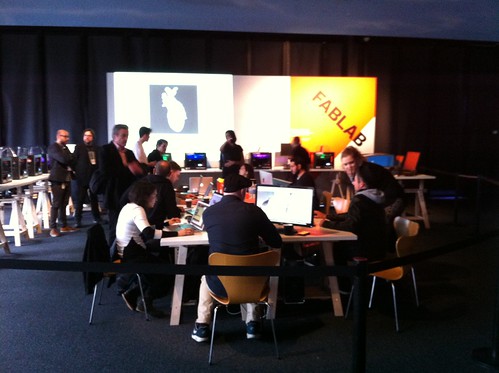
And of course there were drones
I enjoyed seeing the range of makers, and being able to talk with the people behind the ideas. This was fun. People were generous and enthusiastic. I liked the broad interpretation of maker, which is appropriate. There are many exciting ways libraries can connect with the makers in their community.
Monday, August 11, 2014
Pico Branch at Santa Monica
This link shows some lovely photographs of the Pico Branch Library.
Saturday, August 9, 2014
Share the good stories
I have been a fan of the way the National Theatre of Scotland uses social media for a long time. It started when I saw Black Watch at the Sydney Festival, and then looked them up online to find more about their work. This recent storify is very interesting because they have very deliberately put a neutral/negative comment at the start, and then followed it up with positive ones. They could have chosen to to leave out a comment that said "bit disappointed", but they didn't - and I am impressed by that.
As an aside I am also a fan of the National Theatre of Scotland as the two productions I have seen (both thanks to Sydney Festval), Black Watch and Beautiful burnout have been incredible.
As an aside I am also a fan of the National Theatre of Scotland as the two productions I have seen (both thanks to Sydney Festval), Black Watch and Beautiful burnout have been incredible.
Thursday, August 7, 2014
Skill sharing
I came across this site by Michele Carragh recently, about embroidery. Unfortunately I did not record the referring site). I found this site interesting because she is obviously really skilled in what she does, it is her income, and still she shared information so that you can also create dragonscale. I liked the sharing (I am not an embroiderer), because it does not reduce her income, and yet she did not need to do it. She was being helpful.
I felt there was an analogy to libraries. Just because I can sew a little does not mean I will be able to produce her level of product/artwork. So we still need people with her skills, like in libraries, we share our skills and knowledge, but we still need people with advanced skills and knowledge - an increasing the skill of everyone rather than a deskilling of professionals which can sometimes seem to be happening (because "anyone can do a Google search"). Michele Carragh is an amazing artist, but still she shares her tips and methods, exactly like a skilled librarian helping someone learn how to search, or improve their searching skills.
I felt there was an analogy to libraries. Just because I can sew a little does not mean I will be able to produce her level of product/artwork. So we still need people with her skills, like in libraries, we share our skills and knowledge, but we still need people with advanced skills and knowledge - an increasing the skill of everyone rather than a deskilling of professionals which can sometimes seem to be happening (because "anyone can do a Google search"). Michele Carragh is an amazing artist, but still she shares her tips and methods, exactly like a skilled librarian helping someone learn how to search, or improve their searching skills.
Wednesday, August 6, 2014
New technology cart at Los Angeles Public Library
This is a nice way of showing what will be available for a technology sandpit at Los Angles Public Library.It shows a range of staff experimenting, presumably as a way to encourage members of the public to also experiment. Very nicely done.
Monday, August 4, 2014
Gov.ify
To quote from the Gov.ify site
One of the biggest barriers preventing governments from embracingOpen Data is the ability to produce documents in a government-ready, paper-based format. Like a PDF. Or a book. In most governments today, well-formatted XML and machine-readable text are not considered government-friendly formats.To solve this, the OpenGov Foundation has created .gov.ify, a tool which converts machine-friendly text into Government-Ready PDFs.
This is via Steven Clift.
Sunday, August 3, 2014
What if your next strategic partner is a public library? from Nate Hill...
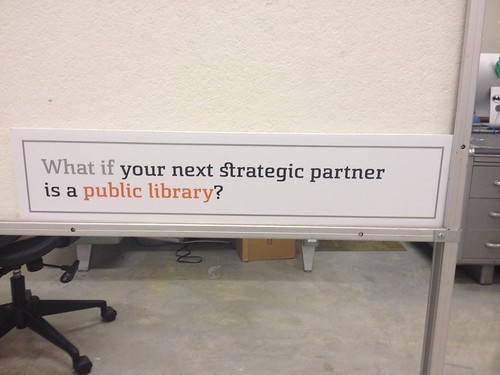 ..
..Quoting the text shown with this image on Flickr
Public Library as ______________.
Make sure you go to Medium and read the full article by Nate Hill.
"I’ve seen libraries drive downtown redevelopment projects, aid
public schools, or lead economic development initiatives. At their best,
libraries become the finest collaborators in their communities; they
flex and act as a bridge between individuals, between organizations, and
between individuals and organizations."
- Nate Hill
Deputy Director
Chattanooga Public Library
Thursday, July 31, 2014
Branding for Bannockburn
Monday, July 28, 2014
Annual reports
One of the nicer, and easier to read annual reports comes from Edmondton Public Library. Have a look at it.
Saturday, July 26, 2014
Trove collection profiler
The Trove collection profiler (thanks to Tim Sherratt) is a wonderful tool for exploring collections on Trove. It is also a great way of finding which collections are not being shared on Trove too.
Transparency reports database
The Transparency reports database brings together government requests for data about users.
Mending and makers
I follow the Tom of Holland blog which is about mending and repair, mostly of knitting. His latest post is called Mending books and it is books about mending, and is well worth reading. There are some lovely examples included. I have not yet seen libraries offering mending programs. It does not mean they are not happening, I have not seen them and would be interested if libraries are offering them - so please add a comment if you know of one.
The mending and repair would fit will with sustainability, and also seems a very neat fit for libraries. Most public libraries will have some collection items relating to mending and repair and these collection items could be combined with library programming. It is a nice way to promote the collection, encourage repair, and help with sustainability. It can also be used as a way to show people how to search on Trove, and do text correction, which is a kind of mending.
There could be partnerships in the programming, like the one on upholstery running as part of the Sydney Design. Partnerships with Mens Sheds could also be valuable, and some libraries are doing work in this area. Or you could establish something like the Brighton Repair Cafe, or work with partners to do this.
It would also be a fit with some of the maker activities running in libraries. It is not making something new, but it is making something older be still usable, rather than becoming discarded, and it can add new character (see this example of mending on the Tom of Holland blog).
Even if you will never mend something, read the Tom of Holland blog for enjoyment.
The mending and repair would fit will with sustainability, and also seems a very neat fit for libraries. Most public libraries will have some collection items relating to mending and repair and these collection items could be combined with library programming. It is a nice way to promote the collection, encourage repair, and help with sustainability. It can also be used as a way to show people how to search on Trove, and do text correction, which is a kind of mending.
There could be partnerships in the programming, like the one on upholstery running as part of the Sydney Design. Partnerships with Mens Sheds could also be valuable, and some libraries are doing work in this area. Or you could establish something like the Brighton Repair Cafe, or work with partners to do this.
It would also be a fit with some of the maker activities running in libraries. It is not making something new, but it is making something older be still usable, rather than becoming discarded, and it can add new character (see this example of mending on the Tom of Holland blog).
Even if you will never mend something, read the Tom of Holland blog for enjoyment.
Thursday, July 24, 2014
interesting use of Storify
I subscribe to updates from Storify which usually means I receive alerts about people I follow on twitter, and a few Storify accounts I follow like Human Rights Watch, ABC news, and National Theatre of Scotland, all really interesting accounts. The embedded Storify came through as well, and while it is not my usual reading, it is interesting because it is an effective use of Storify. It has the the branding of the business (Clarence House) and effective use of the text insert areas, to add to the story told through social media. It also shows how a hashtag (even a really long one) can be socialised into use.
Tuesday, July 22, 2014
Stay in touch with #RBGSydney
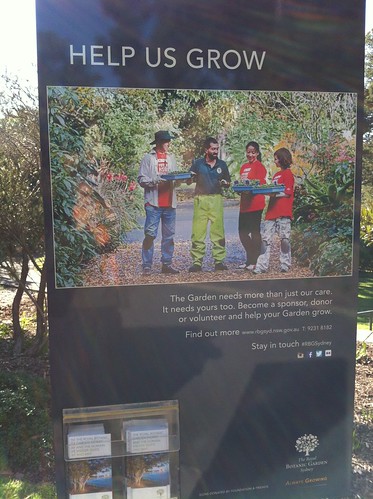
This is an example of the way the Royal Botanic Gardens, Sydney is encouraging people to connect. I like the tagline "stay in touch. It is friendly. I also like that they are telling me able this in the botanic gardens, which I look at far more often than their website. I also like the way they are letting me know I can connect with them on Facebook, Instagram, Twitter and Flickr - all while in the gardens. I wonder if they have noticed an increase in the use of their hashtag since this promotion started a few weeks ago. I hope so.
You can see a few more examples of how they are encouraging connecting to the gardens, and to other people who enjoy them.
Smithsonian Libraries
Recently the Smithsonian Libraries had a survey on their site asking 'tell us how you find and use your digital images'. I am hoping they will be publishing the results of this survey, as it would be very interesting to know where the data is ending up, but also for giving others ideas about the possibilities.
They have a rather nice website too.
They have a rather nice website too.
Sunday, July 20, 2014
Readers advisory unconference - at Darien Library
Thee following are the tweets from a seminar held earlier this year. There are some interesting ideas here and it shows the value of Storify
Scout
Pierce County Library has been doing some very interesting things with their summer reading over the last few years, with summer reading games. This year they have the theme of the Hunger games.
They have also started Scout, targeting people aged 18 and over. They say Build a network of creative individuals who like exploring the library just as much as you do. There are challenges, and you make and discover things. It sounds a really interesting idea, and I will be looking forward to hearing more about it. The tag line is "explore, create, share" which sounds a very good basis for any library service (as well as being a great description of research...and so many other things which happen in libraries).
And of course the Ann Arbor District Library has its summer game running as well.
Saturday, July 19, 2014
Sunday, July 13, 2014
How Your Local Library Can Help You Resist the Surveillance State
How Your Local Library Can Help You Resist the Surveillance State - this is really interesting because I found it by accident. I have an alert set up for my name in case someone says something scary about me I should know about. It was interesting seeing one of my photographs used this way (and with a lovely credit).
Useful article about sharing and museums
The Virtues of Promiscuity brings together some useful points about sharing, from a museum perspective, which also have relevance for libraries. There are helpful links at the end of the article.
Monday, June 30, 2014
The British Museum and the World Cup
Vases from #CRC and #GRE http://t.co/vHCutKeSHe http://t.co/CMf3Al4Z7z #WorldCup pic.twitter.com/3LfDmW47BG
— British Museum (@britishmuseum) June 29, 2014
The British Museum is highlighting collection items which connect to the countries playing in the World Cup. The above example shows the items for one of the matches today.Below is an example from another match
Pendants of rulers from #NED and #MEX
http://t.co/2rPzpQotWw http://t.co/V6PW3zdveL #WorldCup pic.twitter.com/M3YaFVXTAf
— British Museum (@britishmuseum) June 29, 2014
This is a brilliant way to help people discover what is in their collection.Sunday, June 29, 2014
Saturday, June 28, 2014
Horses, almost, at the library
This came through my Flickr stream. It seems a lovely way to promote reading.
Friday, June 27, 2014
You're in the right place
I have seen several photographs of this wall in Chattanooga Public Library. Big thanks to the people who have photographed it for those of us who have not been there.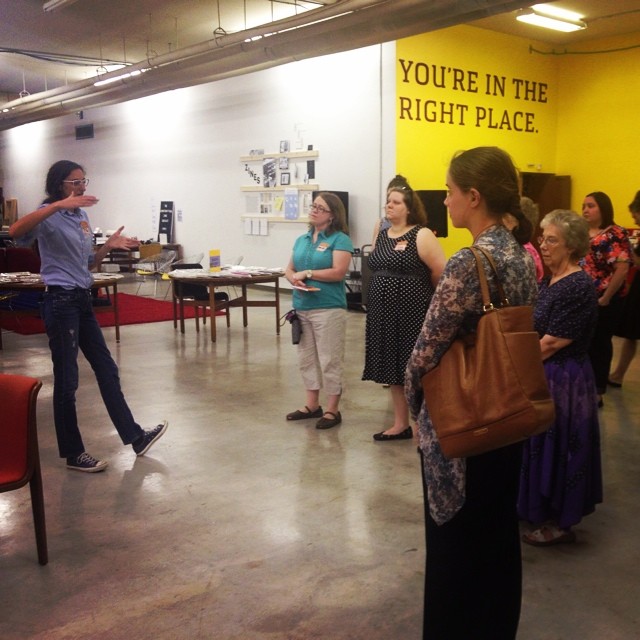
I like this wording because it reassures the clients - you are in the right place. Implicit in this is that the folk at the library (with their various qualifications, skills and experience) are there to help you - whatever your questions, interests or service requirements. It is is a big ask, but - as a client, you are in the right place. There will be people who serve, help, inform...and do this with good grace and using their many skills. I like the hopefulness and the reassurance.

I like this wording because it reassures the clients - you are in the right place. Implicit in this is that the folk at the library (with their various qualifications, skills and experience) are there to help you - whatever your questions, interests or service requirements. It is is a big ask, but - as a client, you are in the right place. There will be people who serve, help, inform...and do this with good grace and using their many skills. I like the hopefulness and the reassurance.
Thursday, June 26, 2014
How I library
I have been following this promotion for a while. How I library is an interesting way of exploring client perspectives, although most of the comments are from library workers so far. The #howilibrary hashtag would be a nice one to encourage your clients to use when providing feedback about a program or service. You could promote it along with your own library hashtag for events. I really like this promotion.
Wednesday, June 25, 2014
My review of Creativity, Inc - a totally amazing read
 Creativity, Inc.: Overcoming the Unseen Forces That Stand in the Way of True Inspiration by Ed Catmull
Creativity, Inc.: Overcoming the Unseen Forces That Stand in the Way of True Inspiration by Ed CatmullMy rating: 5 of 5 stars
This is a very impressive book, which has ideas of relevance for all workplaces. It provides a history of Pixar, and through it is advice on how to manage a growing organisation, and one where they very deliberately worked a the organisational culture. Mistakes were made, but they were addressed rather than covered up. One of the strongest ideas coming through this is that people learn together, and there needs to be effective feedback, without reprisals or point scoring. I will be reading this book again, to further explore the ideas within it. It is an enjoyable read, and it makes you think about how to improve your own work place, as ideas from this book would work well in other industries. A very clear point is that it is about finding the solution for your workplace, rather than copying. There is some very helpful information in the Disney/Pixar merge content.
"Just because "failure free" is crucial in some industries does not mean that it should be a goal in all of them. When it comes to creative endeavours, the concept of zero failures is worse than useless. It is counterprodutive."
and later in the book
"Similarly it is not the manager's job to prevent risks. it is the manager's job to make it safe to take them"
Read, enjoy and apply.
Note - I would have liked to include more quotes, but scraping them from the Kindle version was not happening.
View all my reviews
Tuesday, June 24, 2014
Library as Infrastructure: Places: Design Observer
Library as Infrastructure: Places: Design Observer is an interesting piece with many ideas to consider.
Monday, June 23, 2014
Tweetping
Tweetping shows current twitter activity - and it is beautiful.
Sunday, June 22, 2014
Staff skills as the readers advisory promotion
Edmonton Public Library and Multnomah County Library both promote the skills of their staff in providing readers advisory services. They have different approache which you can look at via the links in the library names. I would prefer "suggestions" rather than "recommendations" were used, for a range of readers advisory reasons, but they are both impressive promotions. They show staff skills being able to help clients in a range of ways. It is a great leveraging of the key assets of any library. I like the diversity of skills described, and the way you can obtain more information and reading suggestions. These are key connections.
I also like the way Edmonton Public Library is making it easy to support them, by having this link in the same line as the social media sharing.
I also like the way Edmonton Public Library is making it easy to support them, by having this link in the same line as the social media sharing.
Saturday, June 21, 2014
National Portrait Gallery on Instagram
I have only just discovered this lovely Instagram account. I really like the way they are seeking conversation.
Friday, June 20, 2014
recording your community

I really like the way Christchurch City Libraries record what is happening in their community for local studies purposes. Their Flickr stream shows a range of photographs recording the community and the library - both important areas for local studies recording. Allen County and Dublin City show other ways of doing this, but Christchurch City Libraries record more of their community. They also did a summary of their seven years on social media.
Thursday, June 19, 2014
Flickr commons
I have a lot of pleasure looking at photographs on Flickr commons.
This is a lovely photograph from the State Library of South Australia.
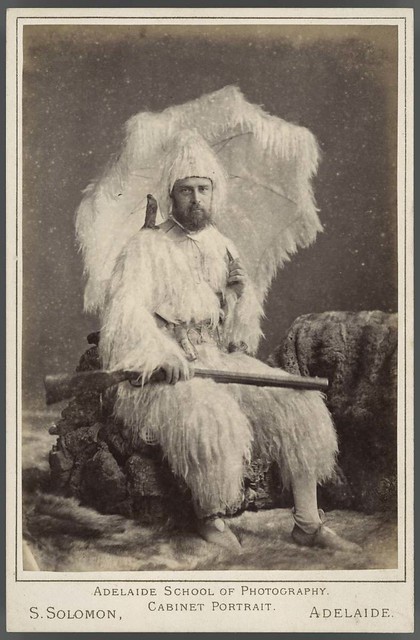
Interestingly it made me think of this
And this photograph shows a bicycle rack most work places can only dream of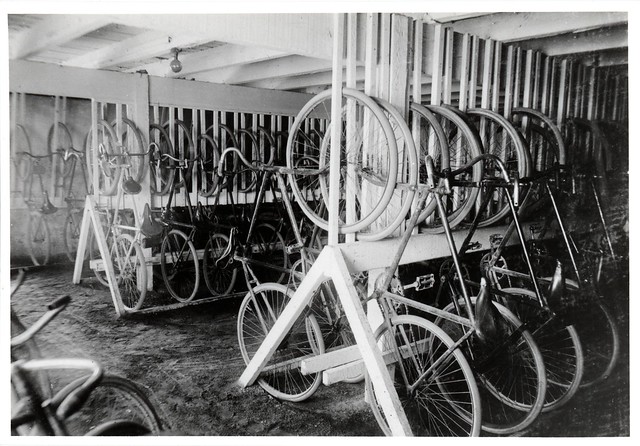
This is a lovely photograph from the State Library of South Australia.

Interestingly it made me think of this
And this photograph shows a bicycle rack most work places can only dream of

Wednesday, June 18, 2014
Welcome to the MCA
This is an interesting list of things to do and not do at the Museum of Contemporary Art, Sydney. Enjoy, ask questions and come back :D
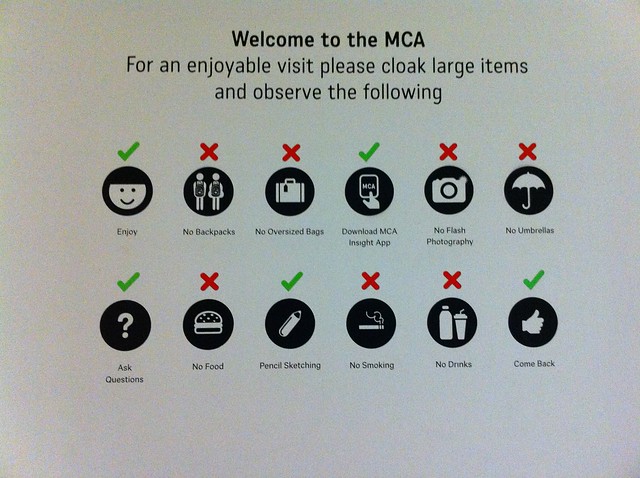

Tuesday, June 17, 2014
The book to art club
This project is part of the Library as incubator project work. I have just joined the book to art club. I am not quite sure how it will work, hence joining. I have borrowed the June book from my local library, but have yet to start to read it.
There are some groups who meet to do the art/craft together but there are also dispersed members. I am trying it as a way to see how it fits with readers advisory work and makers (and I think it will). I will write about it in a future post. The June book is about graffiti so I will be interested to see what (legal) ideas come forth. There is a back list of titles and a facilitators guide.
There are some groups who meet to do the art/craft together but there are also dispersed members. I am trying it as a way to see how it fits with readers advisory work and makers (and I think it will). I will write about it in a future post. The June book is about graffiti so I will be interested to see what (legal) ideas come forth. There is a back list of titles and a facilitators guide.
Labels:
blogjune,
book2art,
makers,
readers advisory
Monday, June 16, 2014
my review of The artist's library
 The Artist's Library: A Field Guide by Erinn Batykefer
The Artist's Library: A Field Guide by Erinn BatykeferMy rating: 4 of 5 stars
This is another new book exploring the area of artists/makers and libraries. The writers of the book manage the excellent Library as incubator project blog. There is a scarcity of writing in this area and this book makes a helpful contribution.
This book seems to be written for library clients/artists/makers, but it can also be used as a source of inspiration and ideas for library staff when developing programs, services and partnerships. There are many examples of how artists work with libraries. There is useful information about copyright and online resources. They explore the "inherently inspiring nature of libraries". Does this describe your library?
The poem by Joseph Mills called If librarians were honest gains a worthy inclusion.
Much of the material has been covered on their blog, but this book bring it together well. The chapters have different themes exploring diverse sources of inspiration and ideas, often within the library. The chapters also include the work of artists relevant to the points being made, and some exercises which artists/makers can do, or which libraries could run as programs or services.
It would work well as a companion volume to Bibliocraft by Jessica Pigza
View all my reviews
Sunday, June 15, 2014
Live streaming premium events
The Sydney Opera House has been live streaming some events for a while, or making the events available later on.
They are currently having a series of Beethoven concerts which you can buy tickets for, or watch for free online. This is impressive. I am guessing (and it is a guess) that they could be using this as a way to build future audiences on site. Some libraries are doing this too.
They are currently having a series of Beethoven concerts which you can buy tickets for, or watch for free online. This is impressive. I am guessing (and it is a guess) that they could be using this as a way to build future audiences on site. Some libraries are doing this too.
Saturday, June 14, 2014
Library consultation by Hennepin County Library
This photograph shows some of the consultation done by Hennepin County Library during the US National Library Week. You can see more images at this link.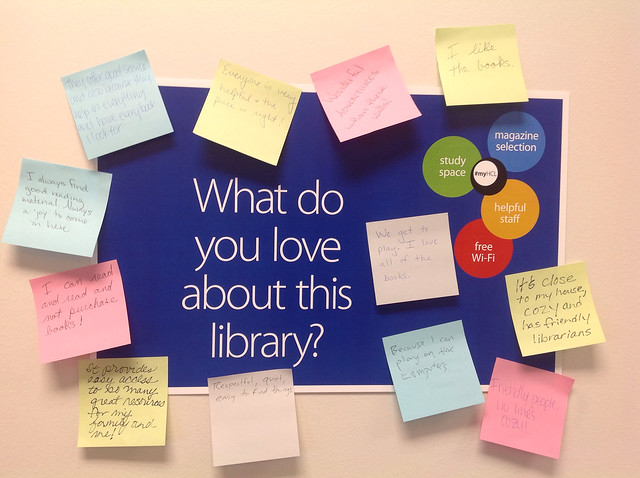
I really like this, and it is a great way to find out how people who use the library think about it.
Another part of this could be taking similar questions to the local park, the farmers markets, and other areas where people who use your library could be. This could be a way to reach people who use your online resources, but don't go into the buildings. It could also be a way to let people who don't use your library know about what could be in it for them.

I really like this, and it is a great way to find out how people who use the library think about it.
Another part of this could be taking similar questions to the local park, the farmers markets, and other areas where people who use your library could be. This could be a way to reach people who use your online resources, but don't go into the buildings. It could also be a way to let people who don't use your library know about what could be in it for them.
Friday, June 13, 2014
Vivid social media
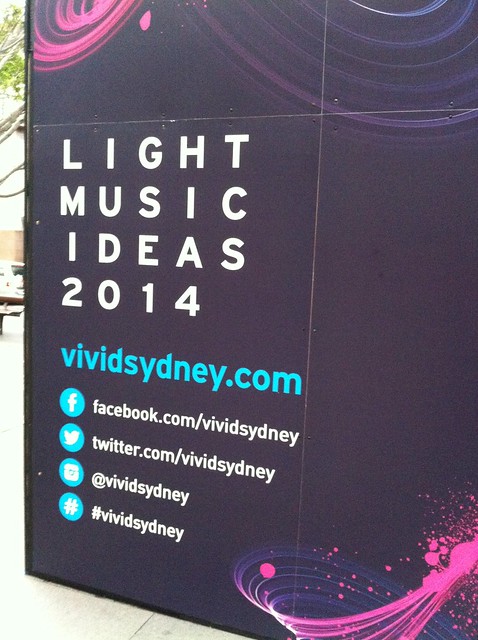
During Vivid this kind of signage was in the area so you could easily share your images and comments with others. I like the way it was really easy to see how to share - it helped the conversation.
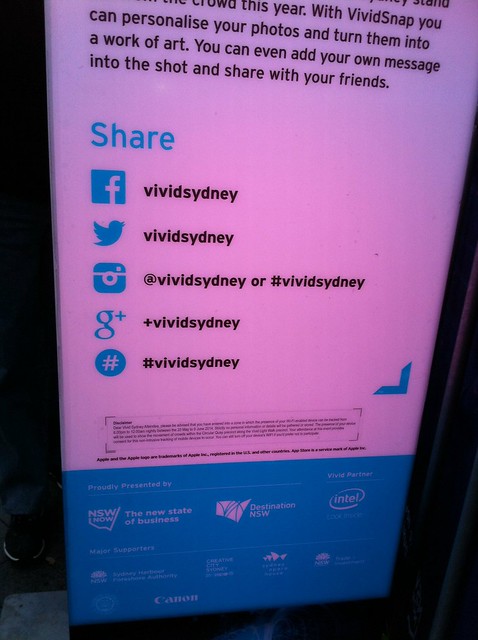
Subscribe to:
Comments (Atom)
